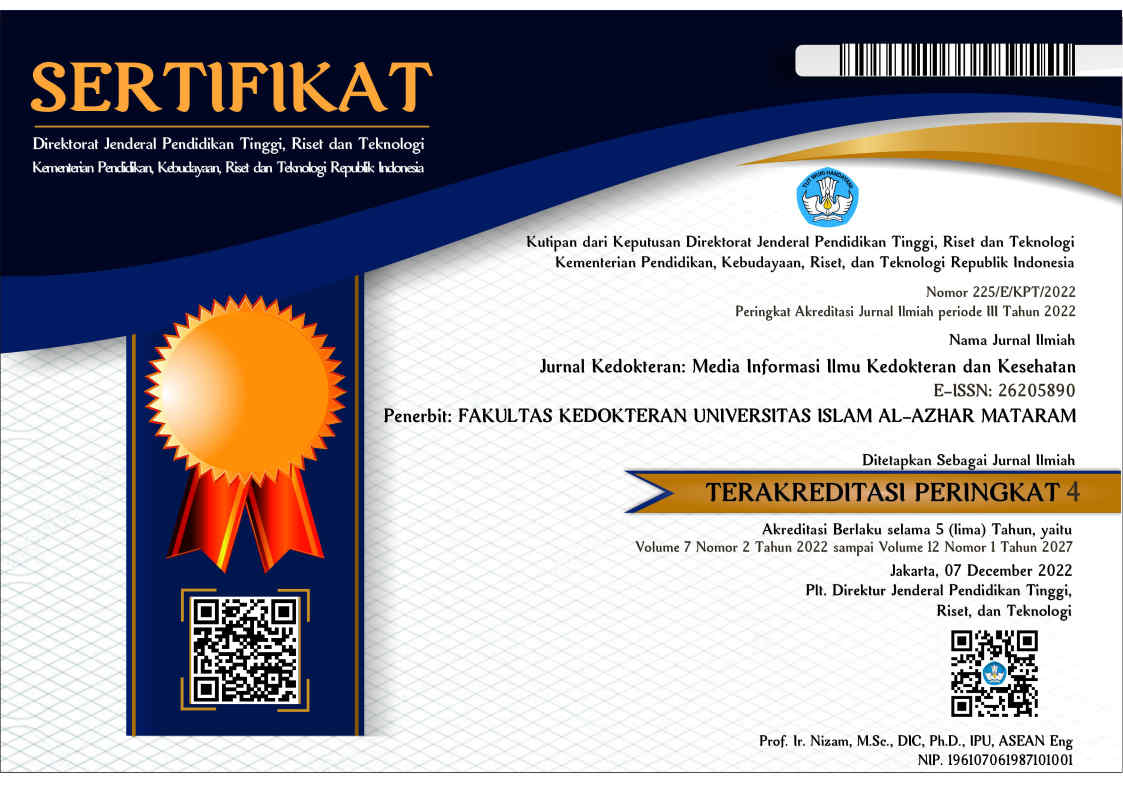Association between Children's Nutritional Knowledge and Nutritional Status among Residents of Muara Bungo Market Area
DOI:
https://doi.org/10.36679/kedokteran.v10i1.82Keywords:
nutritional status, nutritional knowledge, dietAbstract
Background: Nutritional problems in children are complex, both in terms of quantity and quality. Irregular eating habits, plus a lack of nutritional knowledge can affect a child's nutritional status. This study aimed to examine the association between children's nutritional knowledge and nutritional status, and the role of education in forming healthy eating habits. Methods: This was quantitative research with a cross-sectional study design. A total of 30 samples were collected from children aged 5-14 years in the Muara Bungo market area, using a total sampling technique. The research variables were knowledge and nutritional status of children. Data were analyzed using SPSS version 23. Results: 53.30% of children with poor nutritional knowledge had good nutritional status and 46.70% had poor nutritional status. 40.00% of children with good nutritional knowledge had good nutritional status and 60.00% had poor nutritional status. Bivariate analysis showed no statistically significant association between children’s nutritional knowledge and nutritional status (p = 0.715). Conclusion: Nutritional education, healthy eating patterns, and regular monitoring of children's nutritional status at Posyandu and cross-sectoral collaboration are fundamental to improving children’s nutritional status.
References
Asmin, A., Arfah, A. I., Arifin, A. F., Safitri, A., & Laddo, N. (2021). Hubungan Pola Makan Terhadap Status Gizi Anak Sekolah Dasar. FAKUMI MEDICAL JOURNAL: Jurnal Mahasiswa Kedokteran, 1(1), 54–59. https://doi.org/10.33096/fmj.v1i1.9
Aulia, N. R. (2021). Peran Pengetahuan Gizi Terhadap Asupan Energi, Status Gizi Dan Sikap Tentang Gizi Remaja. Jurnal Ilmiah Gizi Dan Kesehatan (JIGK), 2(02), 31–35. https://doi.org/10.46772/jigk.v2i02.454
Chen, L., Hong, J., Xiong, D., Zhang, L., Li, Y., Huang, S., & Hua, F. (2020). Are parents' education levels associated with either their oral health knowledge or their children's oral health behaviors? A survey of 8446 families in Wuhan. BMC Oral Health, 20(1), 1–12. https://doi.org/10.1186/s12903-020-01186-4
Christiari, A., Syamlan, R., & Kusuma, I. (2013). Hubungan Pengetahuan Ibu tentang Stimulasi Dini dengan Perkembangan Motorik pada Anak Usia 6-24 bulan di Kecamatan Mayang Kabupaten Jember (Relationship between mother’s knowledge of early stimulation and motoric development in 6–24 months children in May. Jurnal Pustaka Kesehatan, 1(1), 20–23.
Davis-Kean, P. E., Tighe, L. A., & Waters, N. E. (2021). The Role of Parent Educational Attainment in Parenting and Children's Development. Current Directions in Psychological Science, 30(2), 186–192. https://doi.org/10.1177/0963721421993116
Ertiana, D., & Zain, S. (2023). Pendidikan dan Pengetahuan Ibu Tentang Gizi Berhubungan Dengan Status Gizi Balita. Jurnal Ilkes (Ilmu Kesehatan), 14(1), 3. https://doi.org/10.35966/ilkes.v14i1.279
Ghozali, I. (2011). Multivariate Analysis Application with IBM SPSS 19 program. In Diponegoro University Publishing Board. (5th ed.). Diponegoro University.
Nutrition, P. S., Engineering, F., Surabaya, U. N., Nutrition, P. S., Engineering, F., & Surabaya, U. N. (2016). With the nutritional status of students of Sdn Dukuhsari Sidoarjo Regency.
Jukes, M. C. H., Drake, L. J., & Bundy, D. A. P. (2007). School health, nutrition and education for all: Levelling the playing field. In School Health, Nutrition and Education for all: Levelling the Playing Field (Issue January). CABI Publishing. https://doi.org/10.2471/blt.08.059519
Juliana, E., Nataliningsih, N., & Aisyah, I. (2022). Fulfillment of Nutritional Needs and Child Development. Sadeli: Journal of Community Service of Winaya Mukti University, 2(1), 11–19.
Kassie, M., Fisher, M., Muricho, G., & Diiro, G. (2020). Women's empowerment boosts the gains in dietary diversity from agricultural technology adoption in rural Kenya. Food Policy, 95(November 2019), 101957. https://doi.org/10.1016/j.foodpol.2020.101957
Ministry of Health. (2013). Basic Health Research 2013. In Ministry of Health of the Republic of Indonesia. https://layanandata.kemkes.go.id/katalog-data/riskesdas/ketersediaan-data/riskesdas-2013
Ministry of Health of the Republic of Indonesia. (2022). Pocket Book of the Results of the Indonesian Nutrition Status Study (SSGI) at the National, Provincial, and Regency/City Levels in 2021. Ministry Of Health Of The Republic Of Indonesia. SSGI Pocket https://repository.badankebijakan.kemkes.go.id/id/eprint/4855/3/Buku 2022 rev 270123 OK.pdf
Laksono, A. D., Wulandari, R. D., Amaliah, N., & Wisnuwardani, R. W. (2022). Stunting among children under two years in Indonesia: Does maternal education matter? PLoS ONE, 17(7 July), 1–11. https://doi.org/10.1371/journal.pone.0271509
Lestari, P. (2020). Hubungan Pengetahuan Gizi, Asupan Makanan dengan Status Gizi Siswi Mts Darul Ulum. Sport and Nutrition Journal, 2(2), 73–80. https://doi.org/10.15294/spnj.v2i2.39761
Li, H., Xiao, J., Liao, M., Huang, G., Zheng, J., Wang, H., Huang, Q., & Wang, A. (2020). Anemia prevalence, severity and associated factors among children aged 6-71 months in rural Hunan Province, China: A community-based cross-sectional study. BMC Public Health, 20(1), 1–13. https://doi.org/10.1186/s12889-020-09129-y
Mkhize, M., & Sibanda, M. (2020). A review of selected studies on the factors associated with the nutrition status of children under the age of five years in South Africa. International Journal of Environmental Research and Public Health, 17(21), 1–26. https://doi.org/10.3390/ijerph17217973
Ningrum, S. O. W. (2024). Relationship between Nutrition Knowledge And Eating Patterns With Nutritional Status Of Elementary School Children at LPQ Nurul Hikmah Candisari Semarang. Nutrition Research and Development Journal, 04, 103–111.
Nurjanah, D. T. J., & Nurhayati, F. (2022). Hubungan Antara Tingkat Pendidikan Dan Pengetahuan Gizi Ibu Dengan Status Gizi Siswa Kelas Bawah Di Sdn Campurejo 1 Bojonegoro. Jurnal Pendidikan Olahraga Dan Kesehatan, 10(02), 75–80. https://ejournal.unesa.ac.id/index.php/jurnal-pendidikan-jasmani/article/view/46815
Permanisuci, P. I., & Soeyono, R. . (2021). Asupan Makanan, Pengetahuan Gizi Ibu, Dan Status Gizi Siswa Sekolah Dasar Inklusi Galuh Handayani. Jurnal Gizi Unesa, 1(2), 72–81. https://ejournal.unesa.ac.id/index.php/GIZIUNESA/article/view/42253
Pramono, A., Puruhita, N., & Fatimah Muis, S. (2018). Pengaruh pendidikan gizi terhadap pengetahuan dan sikap tentang gizi anak Sekolah Dasar. Jurnal GIzi Indonesia, 3(1), 1858–4942.
Sidiq, R., Hasniyati, R., & Handayani, M. (2021). Nutrition education and changes in mother's behavior towards fulfillment of vegetable and fruit consumption strategies in preschool children Aceh Nutrition Journal, 6(1), 1–8.
Sugiyono. (2019). Metode Penelitian Pendidikan (kuantitatif, kualitatif, kombinasi, R&D dan penelitian pendidikan).
Downloads
Published
How to Cite
Issue
Section
License
Copyright (c) 2024 Desi Metriana Erza, Karlinda, Icha Wieke Firnanda, Sonia Raudhatul Ulfa

This work is licensed under a Creative Commons Attribution-NonCommercial 4.0 International License.







